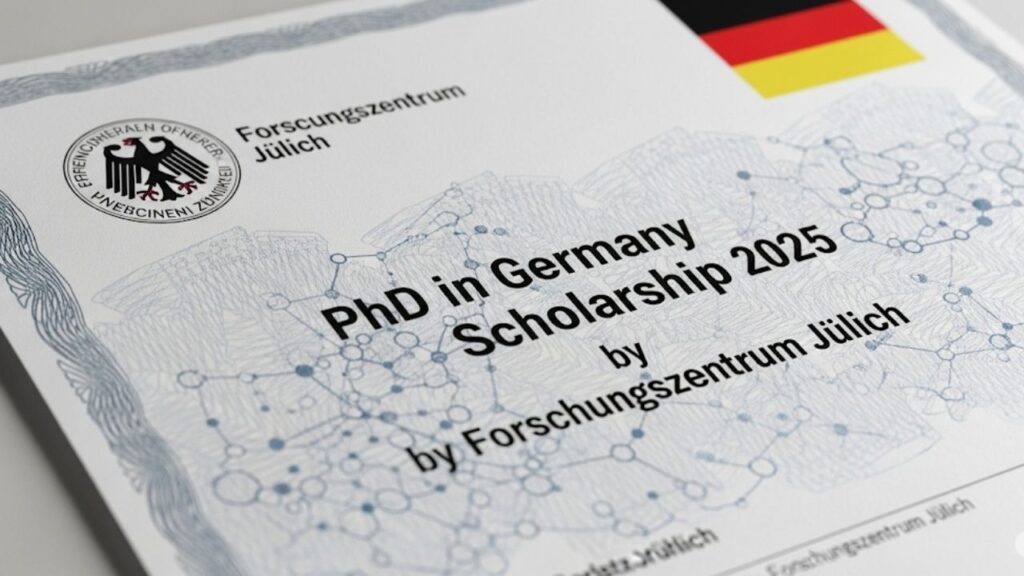Are you a passionate, driven researcher with a master’s degree, dreaming of making a significant impact in your field? If you’re looking for a fully funded PhD opportunity in Germany, then the PhD in Germany Scholarship 2025 by Forschungszentrum Jülich could be your gateway to a world-class research experience. Germany, renowned for its academic excellence and cutting-edge research, offers an unparalleled environment for doctoral studies, and Forschungszentrum Jülich stands at the forefront of this innovation.

Securing a PhD scholarship can feel like navigating a complex maze, but I’ve seen countless successful applicants, and I can tell you that with the right information and a strategic approach, your dream is entirely achievable. This article is designed to provide comprehensive, actionable, and encouraging insights to help you understand and successfully navigate the application process for these prestigious scholarships.
The PhD in Germany Scholarship 2025 by Forschungszentrum Jülich offers an unparalleled opportunity to advance your scientific career in a dynamic and supportive environment. With its commitment to cutting-edge research, comprehensive support for doctoral candidates, and generous funding, Forschungszentrum Jülich is an ideal destination for aspiring PhD students.
Why Choose Forschungszentrum Jülich for Your PhD?
Forschungszentrum Jülich is one of Europe’s largest interdisciplinary research centers, a proud member of the Helmholtz Association. It’s a hub of innovation, pushing the boundaries in fields ranging from energy and environment to information technology and brain research. Pursuing your PhD here means joining a vibrant, international community of top scientists and having access to state-of-the-art facilities and high-performance computing resources.
Their PhD programs are not just about research; they’re about holistic development. Through programs like JuDocS (Jülich Center for Doctoral Researchers and Supervisors), doctoral candidates receive structured training, networking opportunities, and career coaching, ensuring you’re well-equipped for your future career, whether in academia or industry. Many positions are fully funded, offering competitive salaries and benefits, allowing you to focus entirely on your research without financial worries.
Diving Deep: Key Aspects of the Forschungszentrum Jülich PhD Scholarship
The PhD in Germany Scholarship 2025 by Forschungszentrum Jülich typically refers to various fully funded doctoral positions advertised throughout the year across their numerous institutes. These are not always “scholarships” in the traditional sense, but rather paid doctoral positions with employment contracts, offering a salary that covers living expenses and often includes additional benefits.
Eligibility Criteria: Are You a Fit?
While specific requirements can vary slightly depending on the individual PhD project, there are common threads for most fully funded PhD programs in Germany at Forschungszentrum Jülich:
- Academic Background: You’ll generally need a master’s degree (or an equivalent qualification) in a relevant field with a very good final grade. For some highly exceptional candidates, direct admission with a Bachelor’s degree might be possible through a fast-track program, though this is less common and typically requires an entrance examination.
- Research Alignment: Your research interests and academic background must strongly align with the specific PhD project you’re applying for. Forschungszentrum Jülich publishes detailed job descriptions for each open position, outlining the required skills and knowledge.
- Language Proficiency: English proficiency is usually a key requirement, as many research groups operate in English. A B2 level or higher, often demonstrated by IELTS or TOEFL scores, is frequently expected. For positions requiring interaction in German or where the thesis might be written in German, proficiency in German will also be necessary. Always check the specific job advertisement for language requirements.
- Motivation and Skills: Strong analytical and communication skills, the ability to work independently, and a high level of motivation to contribute to research ideas are crucial. Experience in relevant software, experimental techniques, or programming languages (e.g., Python, MATLAB) mentioned in the job description is highly advantageous.
- Mobility Rule (for specific programs like Marie Skłodowska-Curie): Some international programs may have a mobility rule, meaning you should not have resided in Germany for more than a certain period (e.g., 12 months in the last 3 years) prior to the application. Always verify this for the specific call.
Understanding the Funding: What’s Covered?
Most PhD positions at Forschungszentrum Jülich are indeed fully funded, offering a secure financial footing. This typically includes:
- Monthly Salary: The remuneration is generally aligned with Pay Group 13 (75%) of the public service collective agreement (TVöD-Bund). In my experience advising students, this translates to a very comfortable living wage in Germany, often around €40,952 annually (gross), as of recent reports.
- Additional Benefits: Beyond the monthly salary, you can often expect a 60% Christmas bonus, comprehensive health insurance coverage, flexible work arrangements, and a generous number of vacation days (e.g., 30 days per year).
- No Tuition Fees: As with most public universities and research institutions in Germany, there are generally no tuition fees for PhD programs. You will, however, need to pay a semester contribution, which covers administrative costs and often includes a public transport pass for your region. This typically ranges from €100-€400 per semester.
Navigating the Application Process: Your Step-by-Step Guide
Applying for a PhD in Germany Scholarship 2025 by Forschungszentrum Jülich requires a meticulous and well-prepared approach. Here’s how to maximize your chances:
1. Identify Your Research Area and Specific Opportunities
Forschungszentrum Jülich covers a vast array of research areas. Start by exploring their official website, particularly the “Careers” or “Job Vacancies” section, and filter for PhD positions. Look for projects that genuinely excite you and align with your academic background and future career aspirations.
Recent PhD openings at Forschungszentrum Jülich have spanned fascinating topics such as:
- Digital Twin for Power-to-X Systems
- Materials Science for renewable energy applications
- Quantum Computing and superconducting quantum systems
- AI-driven integration of heterogeneous research data
- Modeling and simulation of complex biological systems
- Development of advanced electrolytes for battery applications

2. Craft a Compelling Application Package
Your application is your opportunity to showcase your capabilities and passion. Pay meticulous attention to each component:
- Curriculum Vitae (CV): This should be comprehensive, highlighting your academic achievements, research experience, publications (if any), relevant skills, and language proficiency.
- Motivation Letter/Cover Letter: This is arguably the most crucial part of your application. Tailor it specifically to the PhD position. Clearly articulate why you are interested in this specific project at this specific institute. Demonstrate your understanding of the research, your relevant skills, and how you can contribute. This is where you connect your past experiences with the future project.
- Academic Transcripts and Degree Certificates: Provide certified copies of all relevant academic documents. Ensure they are translated into English or German if the originals are in another language.
- Research Proposal (if required): Some positions might ask for a brief research proposal or a statement of your research interests. Even if not explicitly requested, having a clear idea of your potential contributions can be beneficial during interviews.
- Letters of Recommendation: Aim for strong letters from professors or supervisors who know your academic and research capabilities well. These should attest to your potential as a doctoral researcher.
- Proof of Language Proficiency: Submit official scores from tests like IELTS or TOEFL if English is not your native language and your previous degree was not taught in English.
3. Application Submission
Most applications are submitted online through the Forschungszentrum Jülich career portal. Ensure you meet all deadlines. Some positions might have rolling deadlines or close once a suitable candidate is found, so apply promptly once you find a fitting opportunity.
Life as a PhD Student in Germany: Beyond the Lab
Beyond the rigorous academic environment, Germany offers a rich cultural experience and a high quality of life. The cost of living for PhD students in Germany is manageable, especially with a fully funded position.

- Accommodation: Options range from student dormitories (often the cheapest, around €300-€700/month) to shared flats (Wohngemeinschaften or WGs, around €238-€494/month) or private rentals.
- Daily Expenses: Budget around €150-€250 for food, €110-€150 for health insurance (mandatory), and €30-€100 for transportation (often covered partially by your semester contribution).
- Work-Life Balance: Germany values work-life balance, and this extends to PhD students. You’ll typically have paid holidays and opportunities to explore the country and beyond.
Connecting with the Community
Engaging with the broader research and student community can significantly enhance your PhD journey.
Here’s a relevant social media embed that gives a glimpse into the active research environment at Jülich:
Your Ultimate Guide to University of Winnipeg Scholarships for the September 2025 Intake
Kiwiplan Scholarship Fall 2025 – Up to $7,000 Awaits Final-Year IT and Software Students!
FAQ
Q1: Can I apply for a PhD in Germany without a Master’s degree?
While a Master’s degree is generally required, exceptionally well-qualified international students with a Bachelor’s degree may sometimes be admitted to a PhD program in Germany, particularly through “fast-track” programs. However, this is less common and usually involves an entrance examination. It is always best to check the specific requirements of the PhD position and university.
Q2: What is the typical duration of a PhD program at Forschungszentrum Jülich?
PhD programs at Forschungszentrum Jülich typically have a duration of three years, often with the possibility of extension depending on the project and progress.
Q3: Do I need to know German to pursue a PhD at Forschungszentrum Jülich?
Many research groups and PhD projects at Forschungszentrum Jülich operate entirely in English, especially in scientific fields. Therefore, strong English proficiency is often sufficient. However, basic German language skills can greatly enhance your daily life and integration into German society. For some specific programs or institutes, German language proficiency might be a requirement, so always check the individual job advertisement.
Q4: How competitive are the PhD scholarships at Forschungszentrum Jülich?
The PhD positions at Forschungszentrum Jülich are highly competitive due to their fully funded nature, world-class research facilities, and excellent reputation. Strong academic performance, relevant research experience, and a compelling motivation letter are crucial for a successful application.
Q5: What are the career prospects after completing a PhD at Forschungszentrum Jülich?
A PhD from Forschungszentrum Jülich opens doors to diverse career paths in academia, industry, and research institutions worldwide. Graduates are highly sought after for their specialized knowledge, interdisciplinary skills, and international experience. The JuDocS program also offers career coaching and networking to support post-PhD career transitions.










